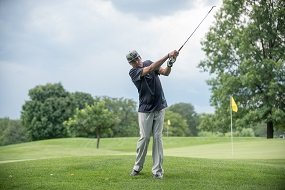This Recovery was Personal

DETROIT – When Rashad Harp walked downstairs into the basement of his Detroit home, he couldn’t miss the shiny new golf clubs, bag and shoes. Strategically placed, they were a source of inspiration for his recovery from rotator cuff surgery, and ultimately, for returning to the recreational sport he had come to enjoy playing in retirement.
People have different motivations for regaining their healthy lifestyle after surgery and their reasons are vast, physically and emotionally. For Harp, it was personal.
“I wanted to be active in my life,” he says, sitting on a porch overlooking the Rackham golf course in Huntington Woods where he works two days a week as a marshal. “I didn’t want to see my life dwindling away.”
Harp stopped playing golf in August 2018 after he felt something pop in his right shoulder during a routine workout on the butterfly weight machine at his gym. He mistakenly thought the weight was evenly distributed when he went to squeeze the machine’s arms on the first rep. “I knew right then and there what it was,” he recalls.
The tendon was already fragile from a small tear that was being treated non-operatively by his doctor, Eric Makhni, M.D., a Henry Ford sports medicine and orthopedic surgeon. The weight training exercise caused the tendon to split without leaving the bone. Typically, the tendon is ripped from the bone during injury.
During surgery in February at Henry Ford West Bloomfield Hospital, Dr. Makhni repaired the tendon tissue to tissue and covered it with a bioinductive collagen patch to enhance blood flow and healing to the surgical site and to preserve the shoulder for years to come.
Typically, recovery from rotator cuff surgery is anywhere from six to nine months.
“We followed him every six weeks after surgery as he recovered his range of motion and strength,” Dr. Makhni says. “Once he got his range of motion and strength back, we were able to progress him to getting his functional activities back, which allowed him to get back to golf.”
Dr. Makhni says patient typically regain 80 percent of their shoulder strength by six months after surgery. After one year, they regain 90 percent. By two years, patients will have gained all the strength they’re going to get back, he says.
“Arthroscopic rotator cuff repair is an extremely common surgery for active adults over the age of 50,” says Dr. Makhni, adding that 40 percent of his surgical volume are shoulder repairs. “Golf is a very dynamic activity with respect to the motion and demands placed on the shoulder. So, the challenge becomes in not only surgically repairing the torn tendons, but in rehabilitating the muscles to the point that patients can get back into sports. We have helped active adults and seniors get back to many different sports besides golf – such as tennis, skiing, even hockey.”
Harp, who retired from advertising sales in 2010, approached his rehab with resolve, adhering to the series of exercises from his physical therapist at Henry Ford’s sports medicine center and performing them at home.
“I wanted it to work,” he says of the rehab. “I wanted to go at this hard. I was just so determined to get back to my quality of life.”
 On July 5 he was cleared to play golf again. But for the rust on his swing, one thing was clear:
“I had no pain, no pain,” he says.
On July 5 he was cleared to play golf again. But for the rust on his swing, one thing was clear:
“I had no pain, no pain,” he says.
It was a meaningful moment for the Detroit resident who grew up playing sports (football, basketball and baseball) and spent a summer in semi-pro baseball. Today, his passion is golf, following in the footsteps of his late mother Evelyn who was a scratch-golfer in her heyday.
Harp played his first round of 18 holes on his birthday in July. His two children played alongside, making the day extra special.
“My swing is getting better,” he says. “It’s freer now. I hit some rockets out there.”
When the weather turns, Harp will spend time further breaking in his new clubs in Arizona and Florida.
“Every day I looked at those clubs as motivation,” he says. “I would pick them up and grip them. All I thought was let’s get through the spring. I was shooting for July. I told (Dr. Makhni), I’m playing on my birthday.”
###
MEDIA CONTACT: David Olejarz / David.Olejarz@hfhs.org / 313.874.4094
.svg?iar=0&hash=F6049510E33E4E6D8196C26CCC0A64A4)

/hfh-logo-main--white.svg?iar=0&hash=ED491CBFADFB7670FAE94559C98D7798)









